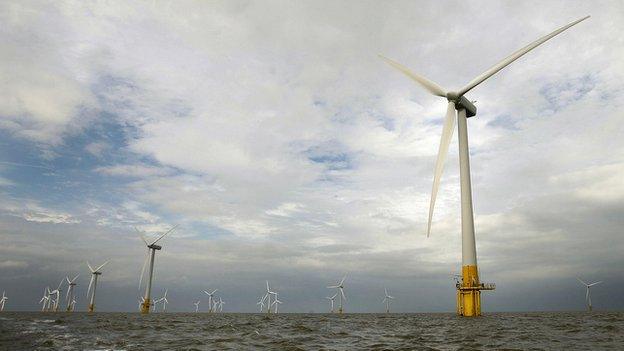Autumn Statement: Living standards trump green agenda
- Published

Offshore wind has received a boost that might help the industry survive
As the Chancellor George Osborne lays out his priorities, environmentalists must be worried they're addressing the wrong narrative.
Labour has reset the debate to focus on the narrow standard of living, rather than the broader quality of life they used to promote (including protecting the environment).
That’s prompted the Chancellor to cancel the fuel duty rise and shave £50 off future energy bills by changes to green and social tariffs.
Both cuts were welcomed as money-savers. But look deeper and you find that the public’s voice isn’t so closely aligned to the government's infrastructure priorities.
A barely-reported survey for the Energy Bill Revolution carried out by the respected pollsters TNS found that 57% of people believe home insulation should be the UK’s number one priority for infrastructure spending.
That is ahead of building new roads (15%), power stations (15%), the high speed rail network HS2 (3%) or new airports (2%). It is an even greater priority for younger people, with home energy efficiency first for around 70% of 16-24 year olds.
The Chancellor talked in his speech about a "job-rich recovery for all", but the insulation cuts, following a campaign by British Gas and others, risk up to 10,000 jobs in the sort of small firms the government wants to nurture.
Has the Department of Energy and Climate Change (DECC) calculated the impact of its insulation cuts on employment? It has not.
Has the government compared the value for money of spending on roads or home insulation to see which creates greater economic, social and environment gains? I am waiting to see the document.
On energy investment, the government, for all the sound and fury surrounding the issue, hasn’t greatly changed its recent policies.
The small cuts for onshore wind (making it cheaper than nuclear power) and large solar energy are generally thought unlikely to endanger either industry.
Cash guarantees are still going to nuclear, and offshore wind has had something of a boost that might help it survive - although this industry is now in the sights of newspapers who successfully campaigned against onshore wind.
Shale gas investors have had their tax breaks confirmed, just after Parliament’s Environmental Audit Committee judged that there was no case for a subsidy for shale, external.
But the government hasn't shown the same largesse towards carbon-intensive manufacturers, who had pressed for the abolition or reform of the carbon price floor which pushes up the cost of electricity.
They say it is making them uncompetitive. But the tax brings the Chancellor £1bn, rising to £2bn from 2015. He must need the cash.
Meanwhile, the squeeze on departmental spending goes on. Cuts have fallen disproportionately on environmental jobs and the Environment Agency is reported by the ENDS Report environmental journal, external to be cutting 1,700 posts.
With austerity measures set firmly in place, the greener parts of government may be bracing themselves for a cold winter.
Follow Roger on Twitter, external